The ultimate goal in developing the sustainability program at Allegiant Stadium is to be good stewards of the community, conserve resources, champion efforts that result in great impact, and empower staff to take ownership of eco-efforts. They do so by finding ways to reduce water and energy usage, divert
material from landfill, purchase green centered products when possible, and educate staff on the importance of these practices.
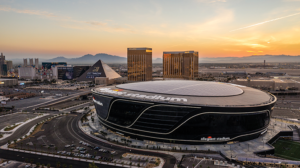
Located in Las Vegas, NV, Allegiant Stadium opened on July 31st, 2020. The stadium is home to the Las Vegas Raiders, UNLV Rebels, and select NCAA football games. As a fully enclosed and climate-controlled venue with a capacity of 65,000, Allegiant Stadium also is host to concerts, sporting events, such as the Pac-12 Championship Game and the Las Vegas Bowl.
The Las Vegas Raiders are especially committed to building a robust sustainability program at Allegiant Stadium. The stadium acknowledges, understands, and embraces the importance of being sustainable members of the community. They do so by finding ways to reduce water and energy usage, divert material from landfill, purchase green centered products when possible, and educate staff on the importance of these practices.
Building in Sustainability
Allegiant Stadium started implementing sustainability programs during the design/construction process. Implementation came in two phases—the first phase being the design and construction, and the second being the operations and diversion phase. For the stadium construction process phase, the project team worked with Western Elite, a Nevada based recycling company, who handled all onsite recycling. From a design perspective, energy efficient LED light fixtures were installed throughout the stadium as well as occupancy sensors used for lighting control. For water efficiency measures, low flow plumbing fixtures were installed throughout the facility.
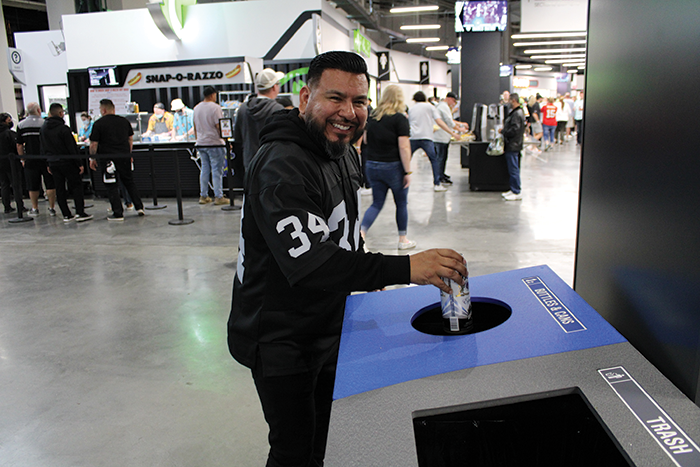
For the second phase—operations and diversion—the goal has been to ensure recyclable and repurposed materials, such as food waste, pallets, cardboard, plastics, and aluminum cans are being collected. “We are continually sourcing ways to divert recyclable materials from the landfill,” says Samantha Cuen Salazar, Director of Maintenance at Allegiant Stadium. Regarding energy efficiency practices, the stadium team uses a data system that aids the engineering team in monitoring energy usage, so to keep below a certain number of megawatts. The team is continually keeping water smart fixtures in good working order to ensure water efficiency.
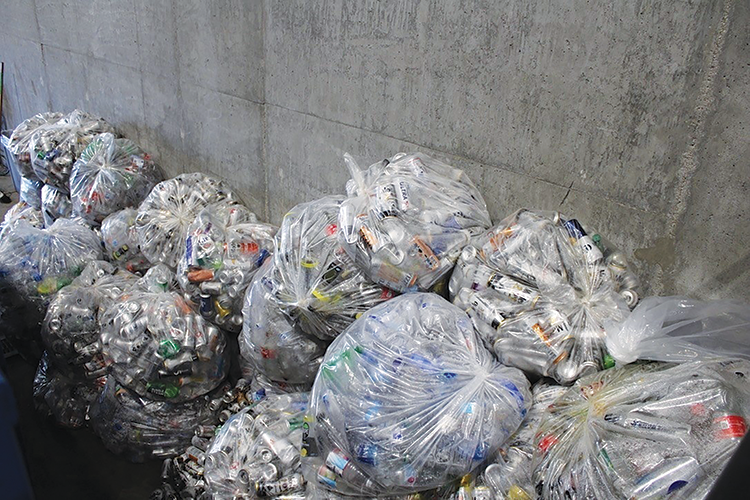
Photos courtesy of Allegiant Stadium.
Maximixing Food Waste Diversion
The Combs Brothers food scrap collection program is a unique initiative that Allegiant Stadium is thrilled to be a part of. Combs Brothers provides recycling services to the hotels and casinos in Southern Nevada. A family business that has been a trailblazer for sustainability in the resort industry for nearly 60 years, Combs Brothers provides onsite equipment and staff to deal with a facility’s waste stream, allowing them to take ownership of their recycling dock to maximize waste diversion and keep their assets out of the landfill. In addition, Combs Brothers owns and operates Las Vegas Livestock (LVL) which processes food scraps into livestock feed. LVL is the only permitted food scrap feeding operation in Nevada.
“The collected food scraps are picked up by COMBS, processed into livestock feed, and fed to pigs at our local farm, Las Vegas Livestock. The EPA food recovery hierarchy recognizes that feeding food scraps to animals is more efficient than bio digestion and composting.” Clint Combs, Managing Member of Combs Brothers.
“All end-of-event food scraps, kitchen prep scraps, and/or expired foods get collected by various entities throughout the stadium. The sustainability program is taking that extra step in food waste collection efficiency by properly training stadium staff, keeping the food waste stream clean of non-food material, and putting up clear signage for stadium entities who handle food waste,” says Krystle Johnson with Alder Tree Consulting, Allegiant Stadium’s Sustainability Consultant.
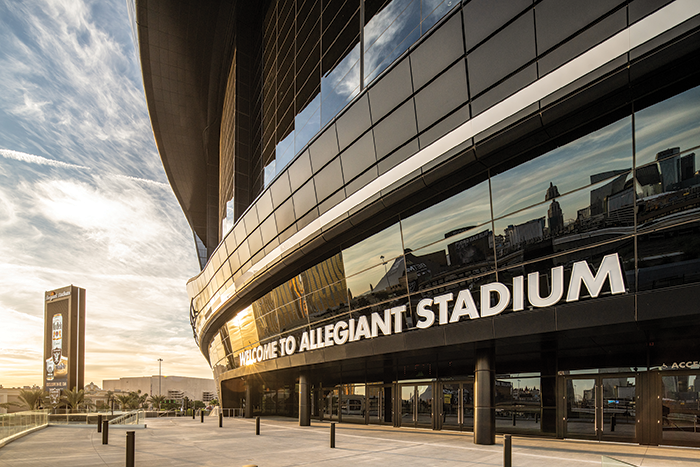
Capturing Cigarette Waste
Most recently, the stadium understood the importance of capturing cigarette waste at Allegiant Stadium. Cigarette waste is toxic to the local watershed system; as rain, runoff water, irrigation systems, and any other surface water mixes with cigarette waste those toxins end up in the local waterways. Allegiant Stadium is an active part of the Las Vegas community, and this means they are dedicated to capturing cigarette waste before it reaches any local waterway.
By working with Butts Only Boxes, Allegiant Stadium is using their receptacles to capture cigarette waste and promote awareness to guests and staff on the importance of proper disposal. They also are the first stadium in the U.S. working with Butts Only Box to capture cigarette waste and turn it into energy. Butts Only Box picks up the cigarette waste collected from the stadium and takes it to a waste-to-energy facility. All the cigarette waste that guests and staff take the time to properly dispose of, is being turned into energy.
“Efficient implementation is key,” Krystle Johnson points out. “Notifying all stakeholders of the new receptacles, training all staff who collect and handle the cigarette waste, and educating guests on why it’s important to dispose of their cigarette waste properly, is paramount. Educating leadership, guests, staff, and all stakeholders on the importance of why this program needs to be successful is also essential; perspective is key. By educating what will happen if we don’t have this program, those facts put things into perspective for the community. Landfill diversion, fire prevention, water improvements, and overall community health are topics that drive our team to want success for this program. People want to make a difference in their communities, and the stadium team is dedicated to their community. We want a healthy Las Vegas and Clark County.”
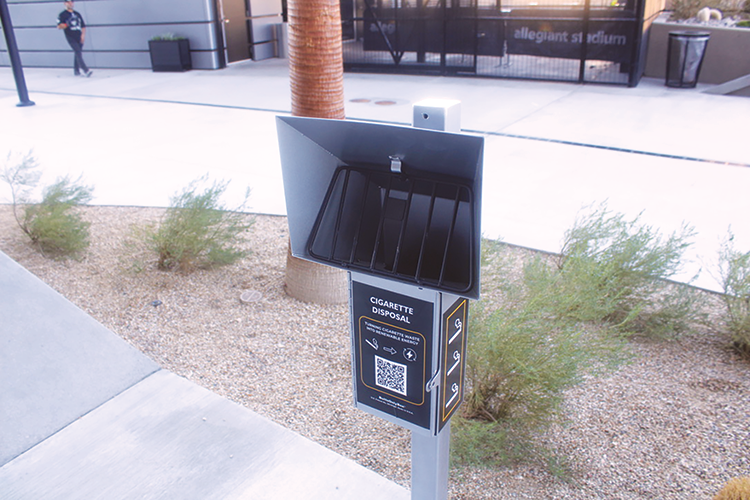
Impact on the Community
By investing in the waste diversion program at Allegiant Stadium, the venue is showing the surrounding community that they are dedicated to the diversion of recyclable and organic material and to free up landfill space as much as they can. “The sustainability team is constantly accessing ways to implement new diversion streams within the stadium operations, ensuring we divert material away from landfill,” says Samantha Cuen Salazar, Director of Maintenance at Allegiant Stadium.
Not only does Allegiant Stadium want to divert material, but they are also doing it in a way where the local community benefits. For example, they have donated e-waste to a local nonprofit, the Blind Center, that repurposes or recycles it. All monetary proceeds from processing the e-waste benefits the Blind Center’s programs which assist the blind or visually impaired.
Making a Difference
The next steps for Allegiant Stadium are to continue to build a comprehensive sustainability program that reduces resource usage, increases waste diversion percentages, donate reusable goods when possible, and educating guests and staff on the importance of sustainable stewardship. The ultimate goal in developing the sustainability program at Allegiant Stadium is to be good stewards of the community, conserve resources, champion efforts that result in great impact, empower staff to take ownership of eco-efforts; all the while providing guests with the best experience possible when they visit.
Sam Johnson, VP of Sales and Marketing says “We want every person that steps foot in the stadium to feel empowered that they, personally, are making an environmentally sustainable difference. By attending events here, guests are supporting the continual growth of the Allegiant Stadium Sustainability Program.” | WA
For more information, contact Samantha Johnson at [email protected] or Krystle Johnson at [email protected].
Resources
https://combsbrothersllc.com/about-us/ www.blindcenter.org/about-us/overview
To learn more about the Butts Only Boxes program, contact Ken Beckstead at [email protected] or visit www.buttsonlybox.com.
